How to Remove Reviews from Livedoor Blog

What is Livedoor Blog?
Livedoor Blog is a major domestic blog service operated by LINE Corporation, a subsidiary of the South Korean IT company Naver. Millions of blogs have been established on this platform. On Livedoor Blog, individuals, celebrities, and companies write blogs in various categories such as illustrated diaries, gourmet, hobbies, business, politics, sports, etc. There are also a wide range of blogs, including summary sites like 5chan (formerly 2chan). Among them, there are also blogs in the adult (for adults) category, and one of the features is the high degree of freedom in posting.
With a variety of content on Livedoor Blog, when you do a word search on search engines like Google, you will often see Livedoor Blogs that contain content close to what you want to research. Also, you can read popular blogs from Livedoor News, so many people use it as a source of news information.
On the other hand, since anyone can register for free and write a blog on Livedoor Blog, there is a high possibility that blog articles containing uncertain information or content that defames or slanders others may be published. In this regard, Livedoor Blog has a high degree of freedom in posting, and there are no proactive deletion measures or monitoring systems from Livedoor. In fact, it is a reality that articles and blogs containing discriminatory content can be found.
What are Negative Reviews Posted on Livedoor Blog?

Livedoor Blog is a blogging service that anyone can start, and as such, there are articles that contain undesirable descriptions and expressions. Livedoor Blog covers a wide range of categories and potential patterns, but let’s introduce an example of a possible negative article.
Slander in Articles by Blog Creators
For instance, let’s say an article stating, “Monolith Sales Co., Ltd. is trash! I hate it! The worst!” is published. If you are on the side of Monolith Sales Co., Ltd., this is nothing but a post obstructing your business. It can be said that such a post, which is slanderous, should be immediately deleted.
However, according to Livedoor Blog’s deletion policy, “1. Content that our company cannot judge as an infringement of rights” cannot be immediately deleted. From the perspective of Livedoor Blog, it is unclear whether “Monolith Sales Co., Ltd.” refers to Monolith Sales Co., Ltd. or a completely different company. Also, it is not easy to determine whether this article is just an opinion or slander. Therefore, it falls under the same category 1, making it difficult to request immediate deletion. Please refer to the details below.
Personal Information that Can Identify the Individual is Published on Summary Sites
Articles containing personal information can be undesirable depending on the content, how the individual perceives it, and its social impact, and can infringe on privacy. Such posts should be immediately deleted as they may not be able to restore the privacy once posted. To request deletion, there are two methods: directly requesting the operator of the summary site or blog, or requesting deletion from Livedoor Blog.
Furthermore, summary site blogs are originally reprints of posts published on other sites such as 2channel and 5channel, so not only deleting the post on the summary site but also deleting the original post is necessary for complete deletion from the internet. For more details, please refer to the article below.
https://monolith.law/reputation/deletionrequest-for-2chand5ch[ja]
Slander and Privacy Infringement in the Comment Section
For example, let’s say a gourmet blogger has posted a visit record of “A Confectionery Shop”. Even if the article itself is positive and has no problems, suppose there are negative comments like, “The cakes here are poisonous. There’s a rumor that they use expired ingredients. No one in the neighborhood eats them.” In such cases, it can lead to reputational damage, so it can be said that the confectionery shop would want to delete such content.
However, the person who wrote the comment is obviously not the blog administrator and cannot be easily identified, so deletion may seem difficult. On this point, according to the guidelines, the rights and obligations of the comments belong to the blog administrator. Therefore, it can be done by making a request to the blog administrator or Livedoor Blog, just like a deletion request for the blog text.

How to Request Removal for Violation of Terms of Use
Livedoor Terms of Use
The Livedoor Terms of Use, under “1.4 Prohibited Actions,” lists a series of prohibited activities. If the review you wish to delete falls under any of these categories, it could potentially be subject to removal. Furthermore, section 1.4.2 outlines the consequences if any of the prohibited actions are committed. This could result in measures such as suspension of blog use, prevention of transmission (deletion), and other penalties.
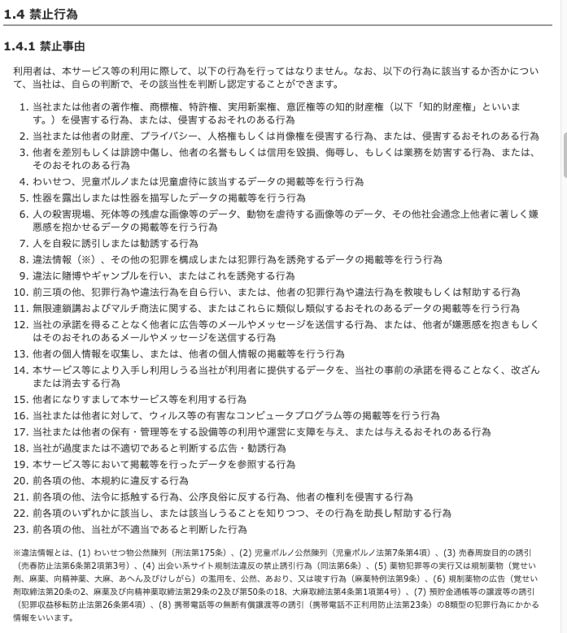
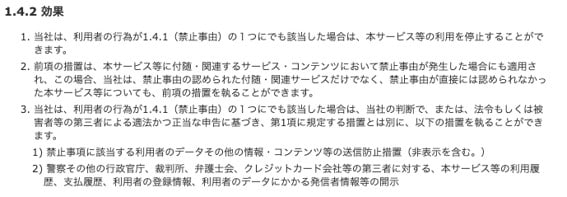
How to Make a Deletion Request
Livedoor offers a high degree of freedom in its services, and the criteria for deletion, as mentioned later, are strict. Therefore, if you want to save time, it may be quicker to directly request the blog administrator to delete the content. However, if there is no response from the blog administrator or if their identity is unknown, you will need to make a deletion request to Livedoor. Livedoor provides an inquiry form for all services, including Livedoor Blog. You can make a deletion request from here.
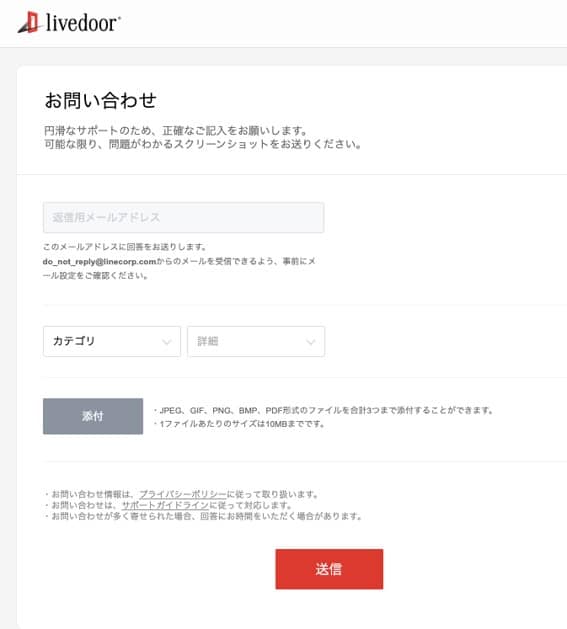
Examples of Making Deletion Requests for Terms of Use Violations
When making an inquiry, please follow this form and specify which blog you are referring to, so that it is easier for the Livedoor Blog team to identify. In the Livedoor inquiry form, it is recommended to use screenshots as much as possible. It would be helpful to attach a screenshot of the article that violates the terms of use or infringes on rights, along with the URL.
For category selection, choose either “Claim of Rights Infringement” or “Report of Terms of Use Violation”. The former mainly applies to cases where your legal rights, such as privacy, reputation, and copyright, are infringed upon, while the latter applies to other terms of use violations. Consider what kind of claim you are making as the basis for your deletion request, and select the appropriate category.
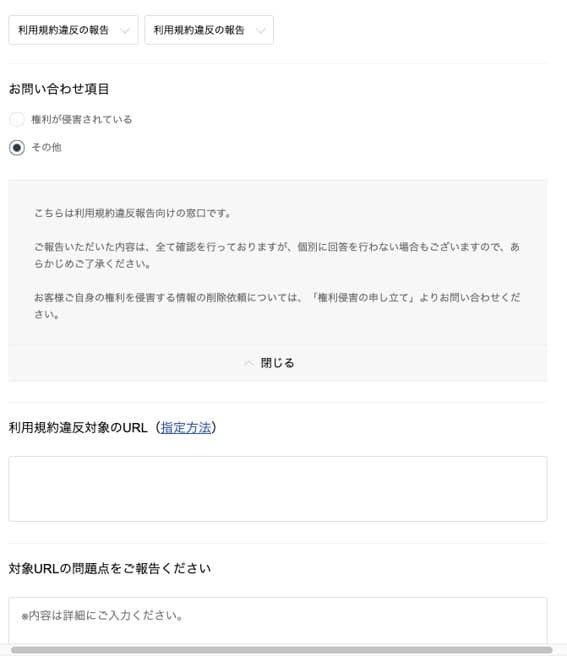
For this example, we will take the case of wanting to delete an article that includes a defamatory expression such as “Trash!” against “Monolith Sales Co., Ltd.” as introduced in the previous example. First, select the category “Report of Terms of Use Violation” and “Others”, and attach the URL and screenshot of the article in question. You should write the problem with the target URL as follows.
Thank you for your attention. I am from the PR department of Monolith Sales Co., Ltd. I would like to request the deletion of this article. From the third line of this review, it is written that “Monolith Sales Co., Ltd. is trash! I hate it! It’s the worst!”
We believe that “Monolith Sales Co., Ltd.” refers to our company. And the expression “Trash! I hate it! It’s the worst!” is defamatory and falls under the violation of the terms of use 1.4.1.3 “Acts of discrimination or defamation against others”. It also constitutes an infringement of reputation rights. Such posts have a negative impact on the sales and business activities of our products, so we would like to request deletion. Thank you for your cooperation.
Livedoor’s Deletion Policy
In the previous section, we explained how to request deletion. However, Livedoor has a publicly available policy titled “About Deletion Policy” in addition to its terms of service.
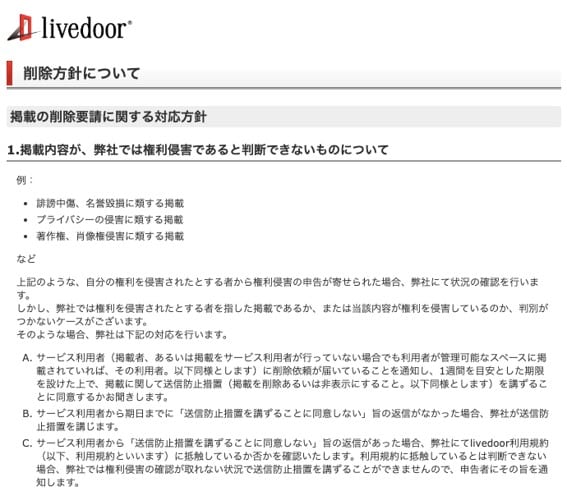
From the explanation page about the deletion policy
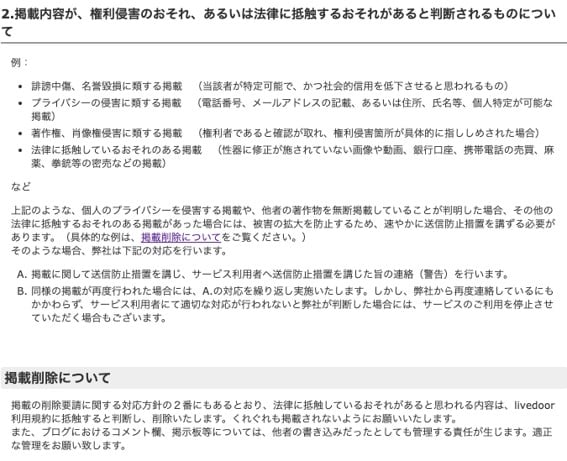
In simple terms, “2. Content that is judged to have the potential to infringe on rights or violate the law” will be promptly deleted. However, for “1. Content that our company cannot judge as infringing on rights”, the blog administrator will first be asked to agree to the deletion. If consent cannot be obtained, the content will be deleted if it violates the terms of service, and if it does not violate the terms of service, it cannot be deleted.
In the case of the previous example, it is difficult to judge whether it violates the terms of service or whether there is a risk of infringing on rights, so it falls under “1”. It may take time and there is a high possibility that it will not be deleted. If it is not deleted, you will have to resort to legal action on the grounds that it is illegal.
Requesting Removal on the Grounds of Illegality

Legal Measures Available
If the content infringes on rights or violates the law, you can dispute the removal through a lawyer in court. The legal measures that can be taken in relation to online reputation damage control can be broadly divided into:
- Request for voluntary removal through transmission prevention measures
- Request for post deletion & provisional disposition
- Request for disclosure of sender information (Disclosure of IP address, name and address)
- Claim for damages (Claim for damages after identifying the poster)
Among these, the requests directly related to deletion are the request for transmission prevention measures, the request for post deletion, and the provisional disposition.
Legal Claims to Make
So, when making a legal request for deletion, the first thing to consider is to claim ‘defamation’. Defamation is established when:
- ‘Publicly’
- ‘Indicating a fact’
- ‘Defaming someone’s reputation’
All of these facts apply.
For example, if a comment based on untrue content such as “The cakes at A’s pastry shop are poisonous. There’s a rumor that they use expired ingredients. No one in the neighborhood eats them.” is posted, let’s look specifically at whether it meets the requirements 1 to 3. First, posts on the internet like on Livedoor Blog can be said to be ‘public’ as they are placed in a state where an unspecified number of people can view them on the internet.
Next, ‘indicating a fact’ means stating a specific fact that is sufficient to lower a person’s social evaluation, regardless of whether it is true or false. In this case, the information that expired ingredients are being used is a comment indicating a fact of violation of the Food Sanitation Act, and it can be said to be sufficient to lower social evaluation.
Finally, to ‘defame’, it is sufficient if there is an abstract risk of harm to social evaluation, and it is not necessary for the reputation to be actually infringed. It is not necessary to prove that the post in question was viewed by an unspecified number of people on internet news and SNS, and that criticism and protests flooded the pastry shop. It is enough to say that there is an objective risk. Please refer to the following article for detailed explanation of the requirements for defamation.
https://monolith.law/reputation/defamation[ja]
Removal through the Court (Provisional Disposition)
When seeking removal due to legal violations such as defamation, the usual first step is to request a transmission prevention measure. However, this is a method of requesting removal without going through the court, asking for voluntary removal by the provider (Livedoor Blog). In Livedoor Blog’s terms of use, it is clearly stated that there may be cases where removal is legally possible, so it is highly likely that removal will be achieved through this method. However, as this is a voluntary measure, there may be cases where removal is not carried out depending on the judgment.
In contrast, in procedures through the court, if removal is approved in the trial, binding force arises from the judgment, and the provider (Livedoor Blog) will be forced to comply with the removal. Therefore, if a transmission prevention measure is not approved, it is effective to transition to legal proceedings. Provisional disposition is a method stipulated in the Japanese Civil Preservation Law (民事保全法), and is used to seek temporary measures before obtaining a final judgment through a formal lawsuit when a quick resolution is required. In cases like this, where there are defamatory reviews, there is a high risk of irreparable damage once they spread, so it is effective to use the provisional disposition system to seek immediate removal of information. When a provisional disposition order is issued, the court orders the other party to remove the post, so the other party will comply with the removal.
In the case of provisional disposition, if you consult with a lawyer who has expertise in reputation damage countermeasures, in many cases, removal can be achieved in about 2-3 months from the request, making it an effective measure. For detailed explanations about the removal of articles in cases of defamation or reputation damage, and the procedure for provisional disposition, please refer to the article below.
https://monolith.law/reputation/provisional-disposition[ja]
Identification of Posters through Provisional Dispositions
If you request a lawyer for identification of posters through provisional dispositions, it is possible to disclose information such as the poster’s IP address through a so-called sender information disclosure request, and potentially identify the poster. By doing this, you can demand compensation for damages suffered due to defamatory posts from the identified sender. The flow of these procedures is explained in detail in the articles below.
https://monolith.law/reputation/disclosure-of-the-senders-information[ja]
https://monolith.law/reputation/livedoor-blog-footprint-specific[ja]
Summary
Livedoor Blog is a highly beneficial site where various categories of articles and blogs exist, and from which a wide range of information, thoughts, and opinions can be obtained. However, due to the high degree of freedom in expression and description, various reputational damages and rights infringements can be anticipated.
At Livedoor, the criteria for article deletion are strict, making it difficult to prove illegality. It is challenging for individuals to handle this due to the specialized content and methods involved, and since it involves legal actions, the assistance of a lawyer is necessary. First, consult with a lawyer to determine whether the said review constitutes an infringement of rights or violates any Japanese laws.
Category: Internet





















